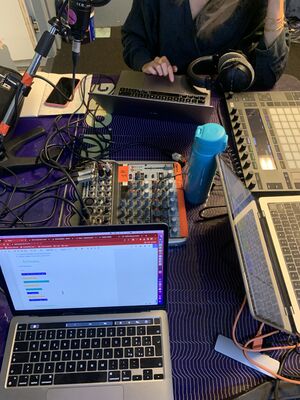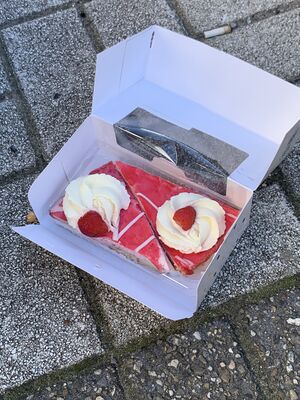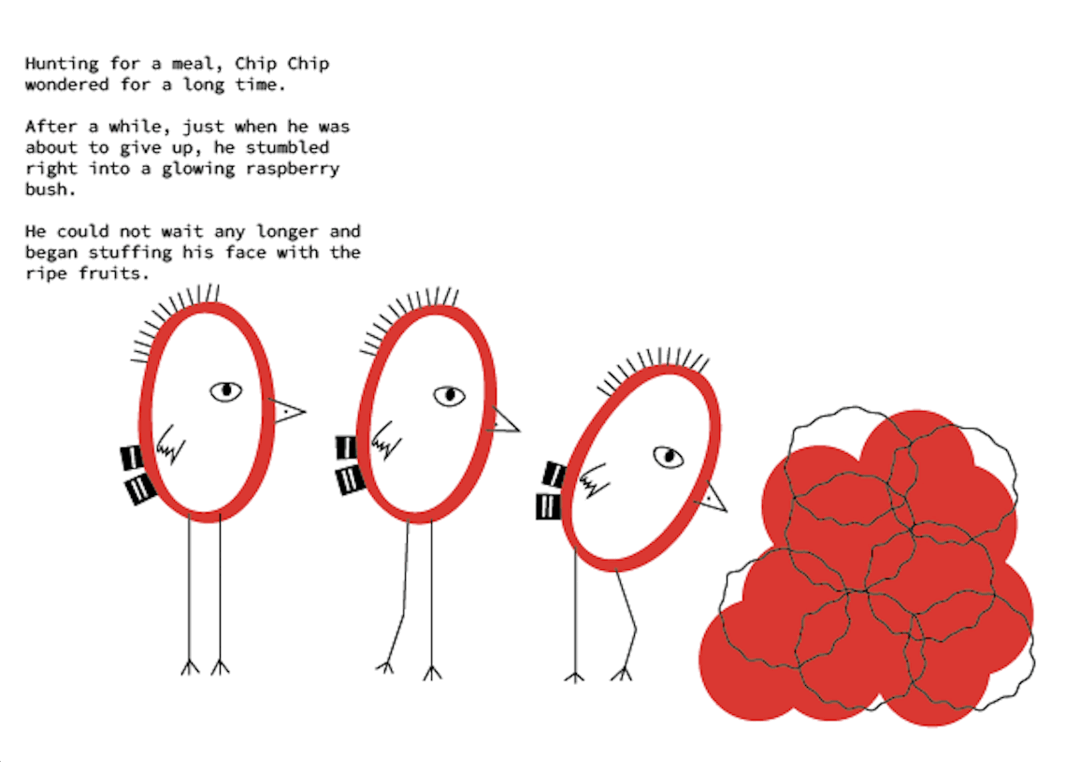Special Issue 22: Difference between revisions
No edit summary |
No edit summary |
||
| Line 91: | Line 91: | ||
==Zine Camp== | ==Zine Camp== | ||
I was very excited to work on projects for Zine Camp, enthusiastic to experiment with different printing techniques and to work on a zine for the origin of chopchop. To help me feel a connection to it, but also because I find its name quite funny. Since I am quite new to servers and RaspberryPis, I thought working on this would make me feel less intimidated to interact with it, and even though it doesn't make much sense... it did. | I was very excited to work on projects for Zine Camp, enthusiastic to experiment with different printing techniques and to work on a zine for the origin of chopchop. To help me feel a connection to it, but also because I find its name quite funny. Since I am quite new to servers and RaspberryPis, I thought working on this would make me feel less intimidated to interact with it, and even though it doesn't make much sense... it did. | ||
Revision as of 20:16, 2 February 2024
Radio Worm: Protocols For an Active Archive
Exploring and creating techno-social protocols for potential active archives of Radio WORM while making radio.
[Retroactive comment] I struggled a bit to document and keep track of what I worked on during this trimester, maybe because I am not really used to archive and report on projects. I am now [after the launch has taken place] trying to write and show a bit of what we worked on during this special issue in a more ordered way (as my personal notes are really quite messy and stream of consciousness).
Week 1
Getting acquainted with Aporee (https://aporee.org/) and discussing field recordings. We each had time to explore the platform and search for a sound relating to a memory. After looking (or listening) around, I picked this sound:
We then all individually recorded the specific metadata of the chosen sound, as well as an explanation as to why the sound was chosen/the memory that made us choose it.
"The sound of church bells on Sunday morning is a familiar one, that has woken me up over and over again, interrupting my sleep and informing me it was time to get up and start my day. So common at home and so rare here, that sometimes I find myself missing the comforting alarm."
We also played with a cassette player, learning how to record on cassettes from radio/other cassettes, as well as methods to "hack" them into being recorded (such as placing a post-it on the holes they have on top) and using magnets to delete sound.
We ended the day by picking the "caretakers" for Radio Worm for the week.
Listening to Bernadette, Victor and Maria on Radio Worm. We interacted with them by communicating through the pad (https://pad.xpub.nl/p/SI22-shownotes-week1). It was interesting and exciting to hear the show live for the first time, even though we only had one day to think about it.
Week 2
First Time live on Radio Worm with Wang and Mania. Experiments with soundscapes, poetry and following structure given by music. I was really quite nervous at the beginning but it went well! We prepared an extensive script to follow. Calling into class did not work as expected as we forgot to take delay into account. Quiz and playing extracts from Laurence Russel Show.
This is our script pad.
After we were done, we ate some strawberry cake as a reward.
Playing with microphones during prototyping. There was one that made me think of what I imagine supermarket announcements are made from, I have never seen one so this information is quite unreliable
Week 3
Did you know chopchop could turn into a radio? By modulating frequencies you can turn it into a microradio by using the pin connected to the clock
$sudo apt install make $sudo apt install build-essential $git clone http: (my notes are incomprehensible) $cd fm_transmitter/
not sure how accurate this is, as my (handwritten) notes are a bit hard to understand during this translation. I will try to test this in the future to check the reliability of this.
Week 4
CSS intro! CSS is a way of styling webpages, and it means Cascading Style Sheets. It has to be linked in the head of an html file like this
<link rel="stylesheet" href="FILENAME">
with
@page
you can set size, margin, crop marks, bleed etc. My practice pages of this are all local on my computer so I am not able to share them here.
We also learned about Regular Expressions [or RegEx], which are tools to do advanced search and replace in the terminal.
This week we also had the breakfast protocol. I brought a banana bread cake.
Week 5 - Autumn Break?
For the broadcast taking place during the autumn break with Rosa as caretaker, we all recorded some introductions for the show:
This is the intro for the holiday special
And this is an intro for the cassette tape experiment section
Rest of week
Meeting with Thijs and Rosa to discuss what we want to do as caretakers for next week more in-depth. We defined what had to be done to achieve our final goal on Tuesday. Thijs made a map of how the flowchart could work, which helped in guiding our decision making process. We worked a lot on the script and prepared for the broadcast the following tuesday, so I don't know if I would fully call this week a break week.
[Retroactive comment] I am very happy with how everything turned out, it was definitely worth 'skipping' the break over.
Week 6
Hitchhikers Guide to an Active Archive broadcast with Rosa and Thijs. Focused on flowchart and creating a choose your own adventure broadcast. [Wiki Page]
You can listen to the broadcast in full here:
It was a lot of fun to work on an elaborate and planned out broadcast, but also a bit stressful how dependent we were on listeners to move us along the flowchart by using the pad.
Zine Camp
I was very excited to work on projects for Zine Camp, enthusiastic to experiment with different printing techniques and to work on a zine for the origin of chopchop. To help me feel a connection to it, but also because I find its name quite funny. Since I am quite new to servers and RaspberryPis, I thought working on this would make me feel less intimidated to interact with it, and even though it doesn't make much sense... it did.
I also worked with Thijs on a further development of Hitchhikers Guide to an Active Archive, by making a choose your own adventure zine based on the characters of the broadcast [Performer, Protocoller and Navigator]. We wanted to create a collaborative zine that needed collaboration to be read/completed. There is a very nice [Wiki Page] that Thijs has made where you can read more about it.
Week 9
As a cooldown from the chaos of Zinecamp, there were no classes on Monday and Tuesday, so I decided to work from home to focus while resting a bit. I brainstormed on ways in which the curtain and quilt metaphors could be potentially implemented inside the apocalypse, as I wasn't ready to let go of them. I also took this opportunity to relax and take a breath before the final sprint of the Special Issue Launch.
Week 10
Today we followed a workshop given by Ahnjili ZhuParris about Machine Listening and Deepfakes. Firstly, she explained to us the basics of machine listening and the algorithms she has developed as a result of her PhD thesis and most importantly talked about the idea of looking at ways (recorded) voice can be analyzed and annotated algorithmically.
Looking into what each of us wants as a result of the special issue, my personal goal for the project being [transcribed from messy notes] "Giving life to the archive of radio worm, so that it is not just a collection of audio files but becomes a warm and inviting place for outside audiences. This could be done by it more accessible or maybe more physically tangible making the individuals who interact with the audio feel like they are part of this archive [community aspect]. Maybe even being able to contribute to it themselves. I think I really like the idea of it being a physical form rather than digital because of this. Tactile aspects?"
From reading out and comparing what each of us wanted we came to the conclusion that we wanted something to make it a space for community contributions and the want for it to be more than just audio files.
Week 11
XPUB 2 had fake assessments we were able to observe. It was quite useful to get an idea of what assessments look like, and hearing more about their graduation projects.
Prototyping and methods were both in support mode for the SI launch. I brought in some materials [to show everyone] for the curtain and started making calculations of how much of what I would need in order to complete it. We separated into smaller task stations to work in a more productive way. I joined the narrative team and the exhibition team.
[Retroactive comment] The notes for the trimester in my notebook stop here, I was very busy sewing the curtain as - like all sewing projects - it was taking much longer than expected.
Week 12 aka launch Week
During the weekend we met with Mania, Thijs, Wang and Zuzu to work on the narrative for the final [Tuesday] broadcast, how were we going to prepare our listeners to the apocalypse? We worked on a general script for the broadcast and Wang prepared a soundscape for us to play during it. A soundboard with emergency messages was created to be used in the broadcast as well as during the launch itself. The whole week was filled with sewing for me. On Wednesday with the help of Lìdia we prepared some apocalyptic phrases to welcome survivors with during the event. The launch was on Thursday and I definitely underestimated how tiring the buildup would be. Overall I am happy with the final results, even though I feel like with more time, I could have been more precise with the building of the curtain and also dedicate more attention to the narrative side of it as I feel like most of my focus went onto the sewing [neglecting the other team I was part of a bit].
Reflection
The week after the launch we all met in the aquarium one last time before the winter break. We reflected together on the outcomes of the SI. As I said, I could have managed my time a bit better in order to give the right amount of attention to the projects I committed to. I also reflected on the fact that during the next special issue I would like to focus more on doing things I am less familiar with, as when the time pressure started to hit, I went straight to what I already know how to do instead of experimenting with unfamiliar methods. Quite a few other people felt the same way as me on this.



